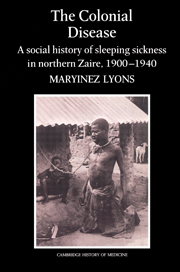Book contents
- Frontmatter
- Contents
- List of maps
- List of plates
- List of tables
- Preface
- List of abbreviations
- Map 1 Africa: political
- 1 Disease and medicine in the history of Africa
- 2 From private empire to public colony
- 3 Mise en valeur: economic exploitation
- 4 Epidemiology and ecology of human sleeping sickness
- 5 ‘The Lure of the Exotic’: sleeping sickness, tropical medicine and imperialism
- 6 Discovery: Liverpool scientists in the Congo
- 7 The campaign. Part one: sleeping sickness and social medicine
- 8 The campaign. Part two: the surveys and tensions
- 9 The African response
- 10 Public health, social engineering and African lives
- 11 Conclusion and legacy
- Appendices
- Notes
- Select bibliography
- Index
7 - The campaign. Part one: sleeping sickness and social medicine
Published online by Cambridge University Press: 06 January 2010
- Frontmatter
- Contents
- List of maps
- List of plates
- List of tables
- Preface
- List of abbreviations
- Map 1 Africa: political
- 1 Disease and medicine in the history of Africa
- 2 From private empire to public colony
- 3 Mise en valeur: economic exploitation
- 4 Epidemiology and ecology of human sleeping sickness
- 5 ‘The Lure of the Exotic’: sleeping sickness, tropical medicine and imperialism
- 6 Discovery: Liverpool scientists in the Congo
- 7 The campaign. Part one: sleeping sickness and social medicine
- 8 The campaign. Part two: the surveys and tensions
- 9 The African response
- 10 Public health, social engineering and African lives
- 11 Conclusion and legacy
- Appendices
- Notes
- Select bibliography
- Index
Summary
The idea of social medicine in the Belgian Congo was born in the special campaign against sleeping sickness. In the words of one colonial doctor, sleeping sickness was a ‘scourge which even an administration as unfeeling as the Congo Free State could not ignore' and by the mid- 1930s most Belgian colonials tended to regard their medical and public health programmes as a form of compensation for the hardships caused by their colonisation of African peoples. But for Congolese populations, the campaign against sleeping sickness had other important implications which affected their existence in ways far beyond the more traditional boundaries of public health. It became widely accepted that the special sleeping sickness campaign was the basis for both the colonial medical service and a public health programme since it was, as in several other African colonies, the first real effort made by the Europeans to deal with the health of Africans. It was during this phase that the real ‘medicalisation’ of the Congolese began. People were systematically introduced to the idea that European doctors and their medications were the solutions to problems of ill health. The Belgian sleeping sickness campaign was elaborated and refined over time until by the 1930s it formed the core of the colonial public health programme. Yet the large-scale campaigns waged against one disease, sleeping sickness, often became so bureaucratised and routine that it was almost impossible to implement important changes in public health policy to deal with other health problems.
- Type
- Chapter
- Information
- The Colonial DiseaseA Social History of Sleeping Sickness in Northern Zaire, 1900–1940, pp. 102 - 136Publisher: Cambridge University PressPrint publication year: 1992

